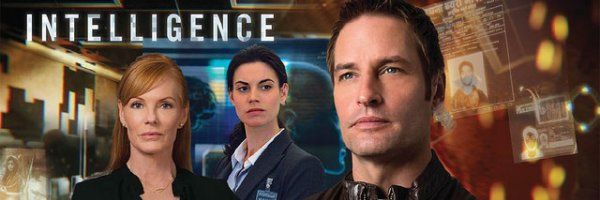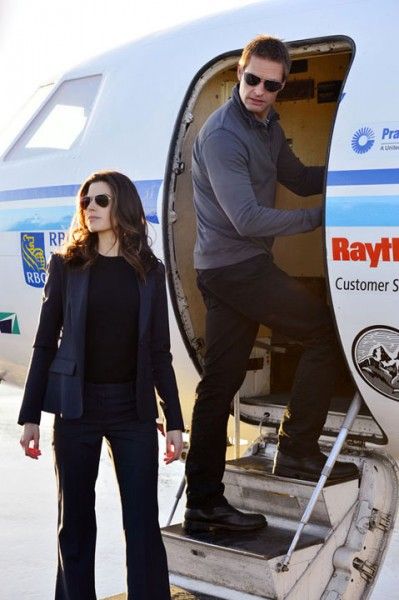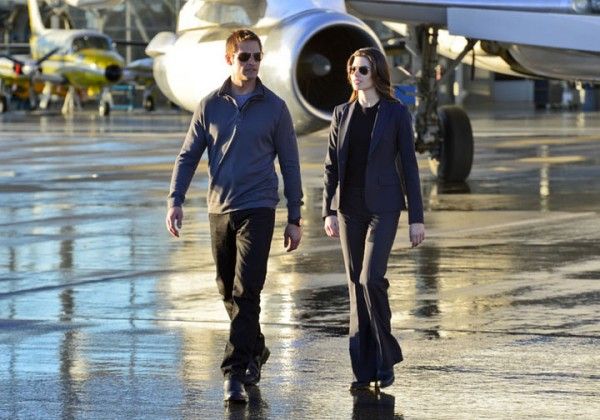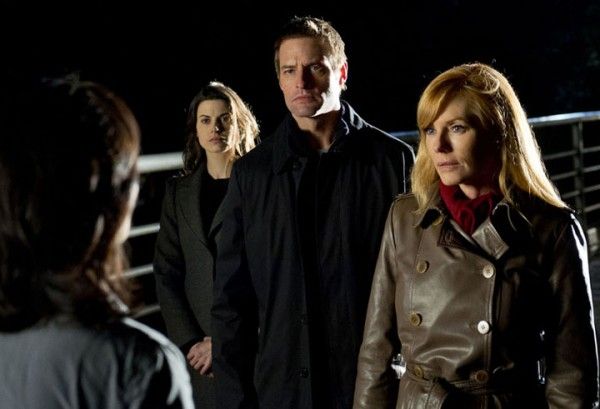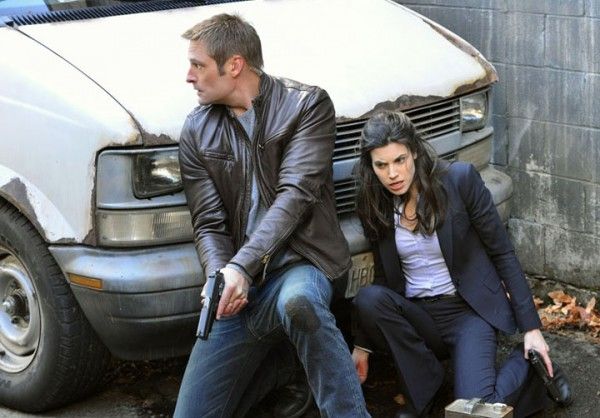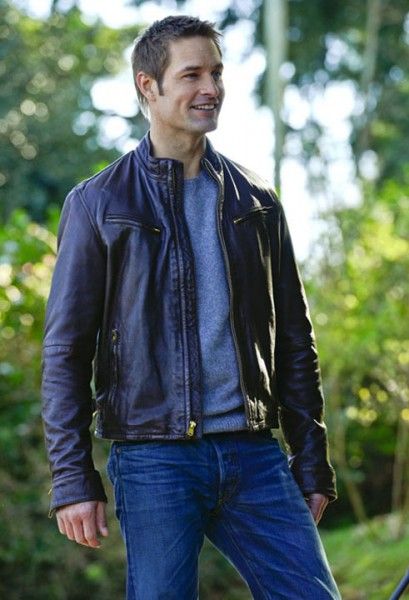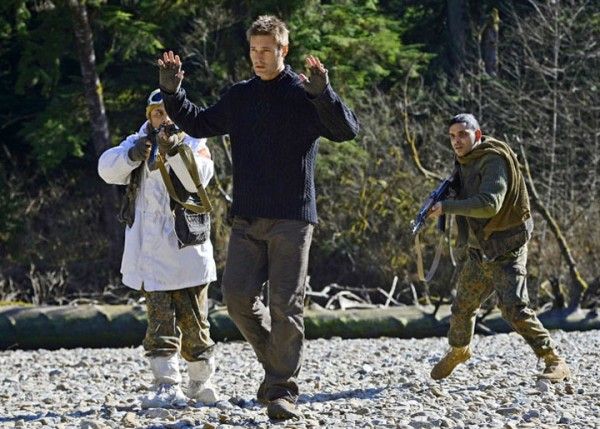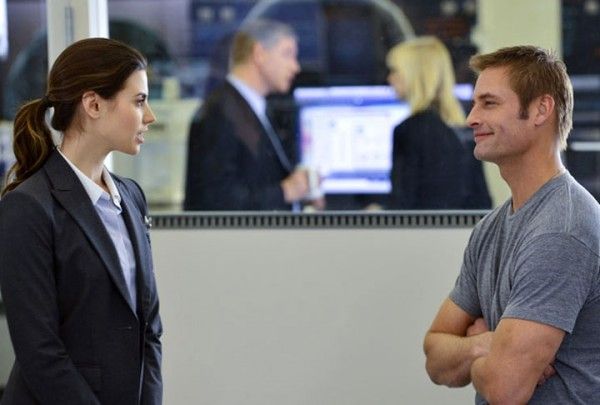The new CBS dramatic thriller Intelligence tells the story of Gabriel (Josh Holloway), a high-tech intelligence operative enhanced with a super-computer microchip in his brain. As the first human ever to be connected directly into the global information grid, he can hack into any data center and access key intel. With an elite team, headed by Director Lillian Strand (Marg Helgenberger), Gabriel and his partner, Secret Service agent Riley Neal (Meghan Ory), fight to protect the United States from its enemies.
To promote the show, executive producers Michael Seitzman, Barry Schindel and Tripp Vinson spoke to a small group of six online writers on the L.A. based set about the dangers of having a microchip like this inside of a human being, what Gabriel’s abilities and limitations are, whether the chip can be used to make him physically stronger, how they’re setting up the series for the long-term, how serialized the show will be versus the procedural aspect, what made them decide to jump right back into the storyline with Gabriel’s wife, why Josh Holloway was the perfect actor for this role, whether there will be flashbacks, and the process for developing the visual aspect for what Gabriel can do. Check out what they had to say after the jump, and be aware that there are some spoilers.
Question: What are the dangers of having a microchip like this, inside of a human with unpredictable emotions?
MICHAEL SEITZMAN: It becomes a big theme for us, throughout the season. Our characters and our stories are constantly measuring the distance between man and machine, and trying to figure out what it means to have a chip in your brain, what the dangers are, in terms of whether that chip could be hacked or accessed, whether it could malfunction and what that means, and how it interacts with you. The questions are questions that we all deal with, every day. There used to be an expression, “Life is what happens when you’re busy making other plans,” and it became, “Life is what happens when your nose is in your Smartphone.” We all just became very connected, all the time, and what does that mean for all of us? With Gabriel (Josh Holloway), we just take it one step further, which is really fun for us. We try not to hit it too hard on the head because, if we get too philosophical, it stops being a fun show. But if you’re just philosophical enough, and you pay just enough attention to it, it becomes interesting, it becomes a part of what makes the character tick and not tick, it becomes part of the fear of the other characters, and it becomes a story engine. It generates problems for the other characters, which is good because you’re always trying to generate problems for them to solve. But, we ask the question all the time. What does it mean for the character when he’s facing the fact that he’s not completely him? And we thread that through the whole season.
TRIPP VINSON: There’s another danger, as storytellers, when you have a hero with superpower. How do you define that? How do you limit that superpower? What is his Kryptonite? All those things are something we spent a lot of time talking about when we initially came up with this whole thing and, over the course of the season, have tried to continue to define and refine that.
What are some of Gabriel’s abilities, and what are his limitations?
SEITZMAN: If it’s connected, somehow, he can get it. If it’s satellite, if it’s on the internet, if it’s over telephone line, if it’s on the global information grid, Gabriel can access it, in some way.
BARRY SCHINDEL: He can’t turn off and on lights, unless they’re connected to something.
Can the chip be used to make him physically stronger, in any way?
SEITZMAN: No. In fact, we have a character him that a couple of times. The biggest thing that you’re doing with a character who has an ability is defining what he can’t do, as opposed to what he can do. You try to approach it from that angle. Storytelling is conflict management. Where does the tension come from? The tension is always going to come from what he can’t do, or what other people can’t do. You get a certain amount of satisfaction and wish fulfillment from the things that he can do.
VINSON: In the development of the character, in very early incarnations, when it was in the very, very early stages, we initially had played around with the character having physical attributes, like strength and speed. But, Michael rightly pointed out that that was going to be a really familiar area to go down, especially given the things we see with Marvel and the superhero movies. You see those powers given to heroes, all the time. The great challenge was when we started to talk about something else that would make him special, that was a different type of power we haven’t seen before. That’s how this all began.
SEITZMAN: We try to think about, “What’s the most fun storytelling?” The more human we make him, the more fun the show becomes and the more fun he is to write. The idea of measuring between man and machine permeates all the stuff that we do. We are constantly thinking, if we ever feel like we’re in the mind of a robot or the mind of a machine, we’ve made a mistake. But if we’re constantly pushing the idea that he’s a human with this ability, then he becomes just like all of us. We do a lot of “what ifs,” like “What if I had that chip? What if I could do that? What would I do with that?” But, if you make him too powerful, too fast or too strong, and he can’t bleed, he’s become so much less interesting. The more human he is, the more he wrestles with it, the more he has fun with it, the more he can joke about it, then the more of a person he becomes. You want to feel, at the end of the day, that you also could be Gabriel, or you could hang out with Gabriel. In a lot of ways, his partner/protector Riley (Meghan Ory) is the character we live vicariously through. The more he’s like us, the better. That’s what’s fun for us.
What else are you setting up, to keep the series going for five or seven seasons?
SEITZMAN: The series can work, as long as you continue to tell good stories. The Six Million Dollar Man comes up from journalists a lot, and that had a lot of legs. You had one conceit, which was that he had these superhuman parts, but they told a procedural. There were characters that you cared about, and then there was a problem of the week for them to solve. We’re only limited by the amount of ideas we can come up with. By the way, that doesn’t mean we’re not limited. As long as we can keep generating ideas, we’ll be okay, and the world seems to generate them very often, for us. Every time we turn on a computer and go on the internet, there’s some other world crisis that we can exploit for our own gain.
SCHINDEL: Ultimately, the series is about the characters and how they react to each other. The chip is a device that we use to solve some of the procedural cases, but I don’t think we’re relying totally on the chip to tell our stories. It’s still about the emotions between Gabriel and Riley. We have plenty of character stories to tell, in addition to the procedural element.
Where are you going to go with the Mei Chen (Faye Kingslee) storyline, now that she’s awake, with a newly upgraded microchip inside of her?
SEITZMAN: Well, she didn’t die. She turned into a great character for us. She became really fun because she’s Gabriel without the conscience. She can do all these things, and she has this advanced chip, so she can do some things that he can’t do, which poses a problem for him. She’s also a terrific actress. She’s sexy and fun, and has a great presence and confidence that the character needed. It’s just fun to write a character who doesn’t really have a conscience. As a villain, you’re always looking for somebody more powerful than your hero. As they say, if you play with a better tennis player, your tennis game gets better. With Gabriel, maybe he gets better because of her. But, it became really fun for us, and she became fun. I don’t want to ruin too much, but she comes back a couple of times, and she’s terrific. We’re really excited about it.
Will there be a rivalry between them?
SEITZMAN: It’s more like, if you found yourself on a planet and you were the only human on the planet, and then suddenly, you found out there was another one, all you would want is to be with that other one. She seems to feel that she and Gabriel are the only ones on the planet. I wanna say that it’s a love-hate thing, but there’s not a lot of hate there. I think she loves him, in her own way. She thinks they’re Adam and Eve.
VINSON: They’re set up as rivals, though. When she re-emerges, she’s doing things that he needs to stop. There’s conflict.
Who is she working for? Is she a free agent?
SEITZMAN: Yeah. She’s a mercenary. She emerges as this really powerful, really mysterious mercenary for hire. We don’t really know that much about her, when he first encounter her. If you sense that we’re being careful, we just don’t want to give story points away because they’ll be really fun for people to watch. But, she re-emerges as a really fun character with a lot of abilities, who works for clients. We’re never quite sure how she meets them or how they pay her. We just know that she’s a gun-for-hire. She’s a chip-for-hire.
Is Amos (Elden Henson) still connected to her, in some way?
SEITZMAN: He might be. You want us to be a little bit coy.
Is the story with Gabriel’s wife over, after Episode 2, or will that remain unresolved?
SEITZMAN: We’re not sure if she’s really dead. She’s dead, as far as we know, at the end of Episode 2. But, part of the fun of this is that we want to unfold the story in a series of fun reveals for the audience. We don’t want to give it up too soon. It will continue, over the series. We don’t quite know for how long yet. There are a few threads that we take throughout the first season, and then into the second season. We have several story arcs that traverse into the second season, if there is such a thing.
SCHINDEL: Gabriel got the chip to find his wife and his wife, in his mind, is dead. That leaves him in a quandary about, “What do I do now? I got the chip to find my wife, and that mission is now over. Now that I have the chip, what do I use it for, if I originally got it to find my wife?”
Why did you decide to jump back into that story in Episode 2, instead of holding it for later in the season?
SEITZMAN: I don’t know. Part of it was that we wanted to free Gabriel up, so we didn’t have a character that was spending all of his time looking for somebody. We don’t want to reveal too much for the audience, but we just liked the idea. It was one of those things. You start to write it and go, “Well, what if this happened?” And you like it, so you do it. Most of the time, when you’re writing, you’re just trying to please yourself. You’re trying to write the show you want to watch. So, you get to the next episode and you go, “What am I thinking about right now, as a viewer? What do I want?” You want to be satisfied, as a viewer, so you write what would satisfy you, as a viewer. You try not to think too hard about where it should take place. You just think about how it’s going to be satisfying.
VINSON: I think we’ve also found some other things that seemed very interesting to do for the season finale. Putting that to bed early felt like that was an interesting and expected thing to do because most people would expect that to be at the end of the season. And it definitely freed the writers up, in terms of Gabriel and his mental attitude and what he’s struggling with. It gives him more bandwith because we’ve put a pin in that, for now.
What did Josh Holloway bring to the role that made him the right actor?
SEITZMAN: He’s really human. The thing that everybody responded to with Lost, and why he pops on that show the way that he does, is because of the qualities I described. If you think of all of your favorite movie stars, there is an element of wish fulfillment, but there is also an element where you feel like you know them. Everybody calls certain people by their first name because you just feel like they’re in your living room. Josh has that thing. He smiles and the whole planet seems to shift. He’s sexy. I’m sayin’ it.
Did it take some convincing to get him to do this, since he had been away from television for awhile?
SEITZMAN: He was highly sought after because he had decided he could be convinced. He was putting his toe in the water. There are 80 or 100 pilots getting ready to go, and people are vying for the same people. But, everybody wanted Josh. I don’t know what drew him to it, but we were in a long line of people that wanted him. Just the idea that he was coming back to television had the whole town lit up. So, we put our hat in the ring, and we won the sweepstakes.
Where would you put this show in the realm of previous shows on television?
SEITZMAN: Six Million Dollar Man is probably a really good one for us to reference because it dealt with similar themes. In that case, it was physical strength, which meant something different in the ‘70s than it would mean today. In a world where you can press a button and a drone five miles up can kill a man on the ground, does super physical strength matter as much? It probably doesn’t. In an era where your watch can do more than the first lunar landing did, is physical strength that important? Probably not. So, we have a very strong, athletic, military experienced character. The idea of being able to access the same information grid, just in a different way as the rest of us, is incredibly compelling. So, it’s a Six Million Dollar Man for the modern age, with brain over brawn, although there’s plenty of brawn to go around.
Will this show be in a case-of-the-week structure? And how are you balancing serialized aspects on a network that is so heavily focused on the procedural?
SCHINDEL: It’s case-of-the-week, but the cases have a lot more to do with the characters than a ripped-from-the-headlines thing. Generally speaking, we like to do stories that are stand-alone stories, but continue the mythology of Gabriel struggling with the chip. So thematically, every story we tell relates back to Gabriel and his relationships with the other people on the show.
VINSON: I think the percentage of serialized, in this series, is more than what you might think, given that it’s CBS.
SEITZMAN: Yeah, it’s more than normal, although they’ve been doing more of that lately. I think we benefitted from a 13-episode order, in the sense that we can have a thread that starts in Episode 1 and finishes in Episode 13, and you didn’t have to commit to 22 or 24 episodes to be able to follow that. We’ve tried to be very mindful. With every episode that we write, we stop and say, “If you were just joining the show right now, where would you be confused? How do we catch somebody up, so that they don’t get into Act 1 and go, ‘What’s going on here?’” And we try not to be too mysterious. We try to let people in to the show. Certainly over the first six or seven episodes, people will be joining the show who haven’t seen the pilot or haven’t seen Episode 2, and can they experience the show, in the same way, or at least in as satisfying a way? And we also have to stay loyal to the people who are loyal to us. It’s a challenge. We think about it, all the time. We’re really mindful of it.
What are the serialized aspects?
SEITZMAN: We have a bunch of characters who reappear, over the course of the season. We have the Director of the CIA and we have the Director of National Intelligence, played by Lance Reddick and Tomas Arana, respectively. We have other characters who our characters know. We bring back an ex-boyfriend of Riley’s. There are little storylines that we return to, or that we dip a toe into. That allows us to populate a world, so it feels like a real world. It’s not just new characters, every week. You’ll feel like there is a community that we’ve created. But, there are certain storylines that carry more weight, so we lean on them a little bit more than we will with some of the other ones that we’re dipping a toe into.
Will you delve into the characters’ personal lives, at all, or have any flashbacks?
SEITZMAN: We’ve had some flashbacks, and we’ve gone home with them. Our characters travel every week because there’s a crisis in Syria, Seattle or London, so we don’t go home with them as much. We try to begin the show with a moment that we pay off, in some way, later. We dip into their personal lives and we try to be mindful of their personal lives, so that we’re creating fully well-rounded characters, as much as we can.
What was it like to develop the visual aspect of what Gabriel can do?
SEITZMAN: That’s a great question. It was a real process that we went through. Dave Semel was the director of the pilot, who’s remarkably talented, and we spent a lot of time trying to figure out what he would see, how he would see it, and how the chip’s information would manifest itself into what he sees in front of him. There is what you experience in your head, and then how you can take what’s in your head and let other people see it. When you dream at night and you try to explain that to someone in the morning, there’s a reason why they roll their eyes. It’s just not as compelling, as it was to you when you were dreaming it. We were mindful of that, in terms of what Gabriel experiences in his head, and how we make that visually compelling and understandable for the audience, so that we can articulate all of that information. It’s been really fun. Our visual effects company, Zoic, is really terrific. We’ve created a real visual vocabulary for Gabriel that you become used to, very quickly. The big idea for that was that he’s always seeing that stuff. It’s just about what he chooses to focus on.
VINSON: We had to give a lot of thought to how to show that, and also shoot it so that we can get a performance out of Josh. If you think about the other times you’ve seen this done, like in the Terminator movies or how they shot Minority Report, Dave Semel was very clever, in the way he helped design that whole look for us. The other thing we did was look at the way your iPhone works and the way technology is integrated into our lives, every day, so that we could make it feel like that rather than feeling like what they did in Terminator, which was super-computerized. That was right for that character because he’s a robot, but that’s different from what our needs are. Every time we were dealing with visual effects, we wanted to lean into the organic feel of it, and not the robotic, technological side of it.
SEITZMAN: We wanted to find a way that Josh could play it without looking like it’s all brand new to him. We wanted him to play it like it’s just a part of him. And Josh was very mindful of that. He didn’t want to feel like a robot. He wanted to feel like a man who had all this stuff going on, and that he would react to the things that he was seeing, no differently than you would react to feeling the buzzing in your pocket from your phone. It’s just a part of your life now, and that’s the way the character has to respond.
Will viewers actually get to see when Gabriel first got the chip, in a flashback?
SEITZMAN: Not this season. But next season, maybe. That’s a good idea.
Intelligence airs on Monday nights on CBS.

